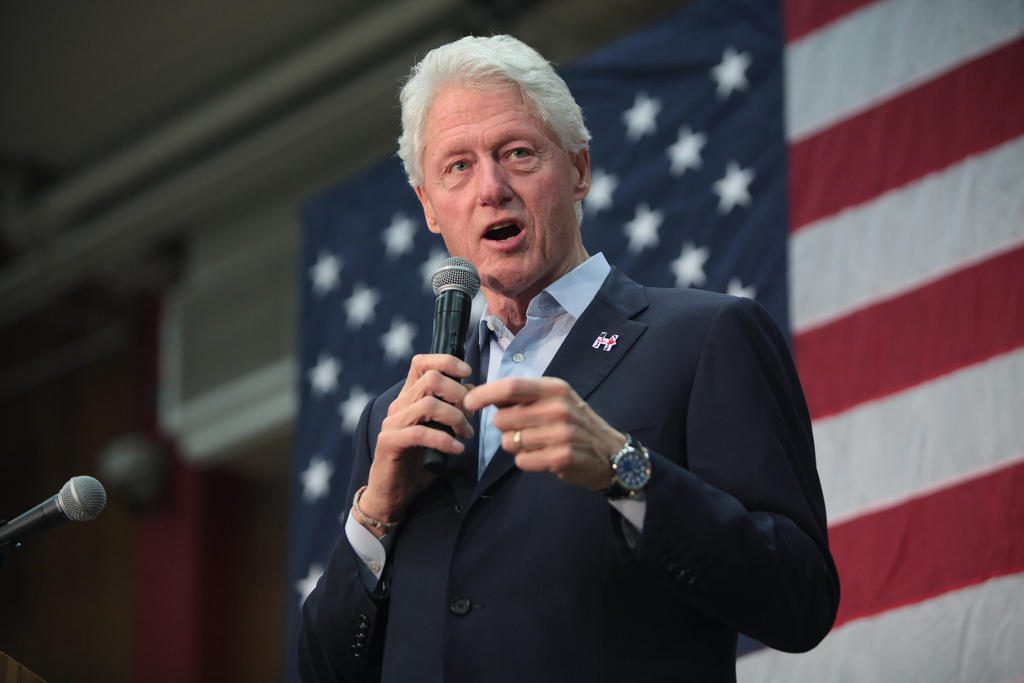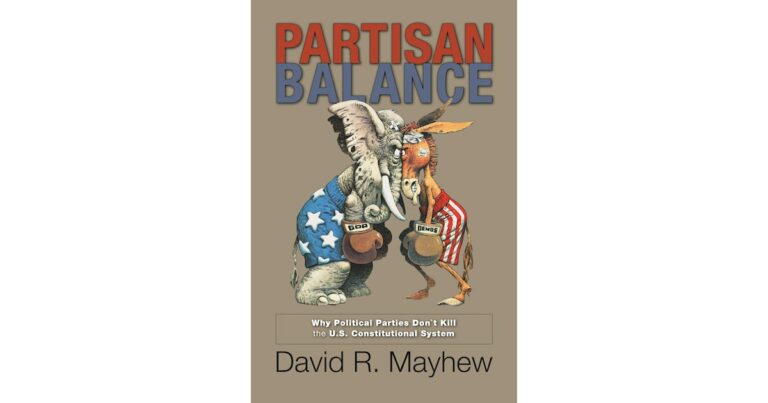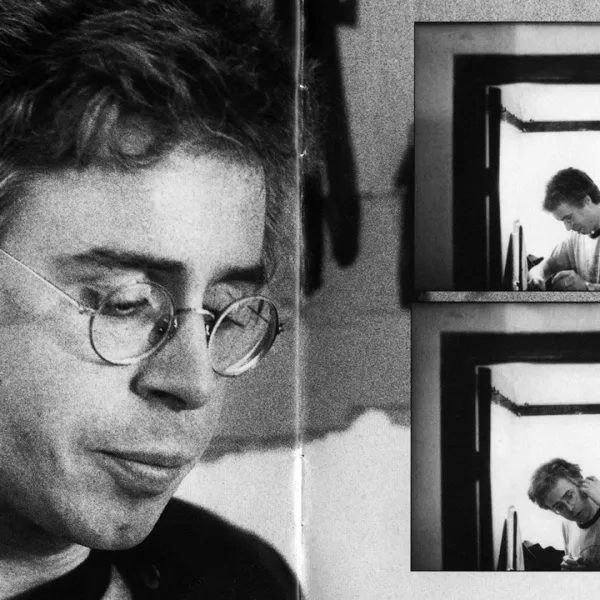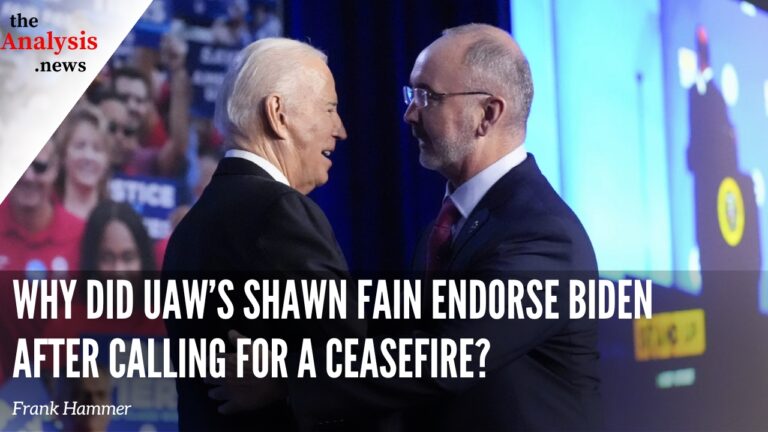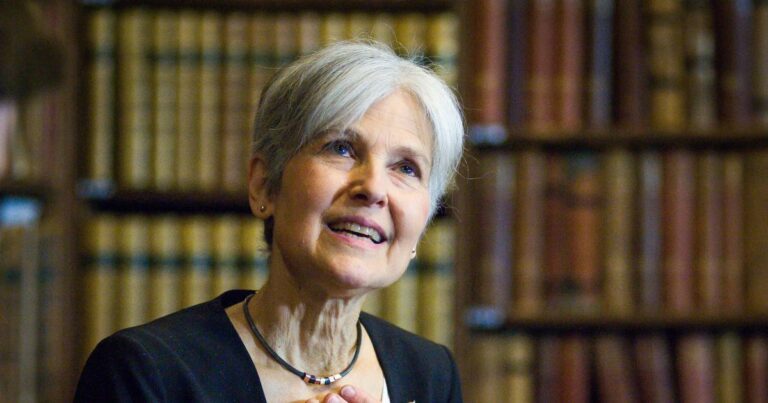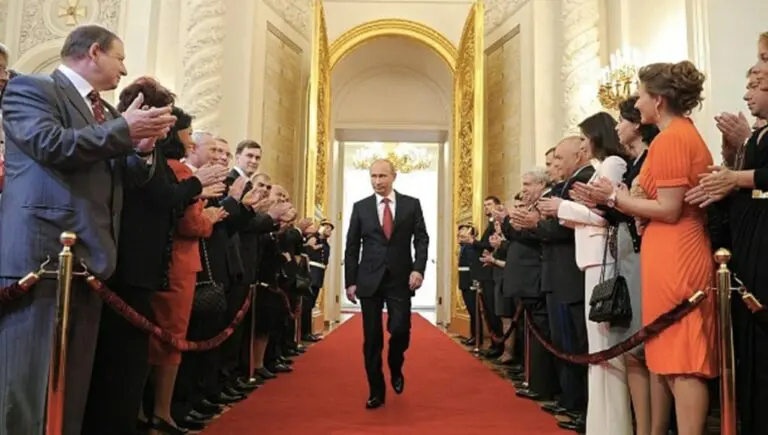Bill Clinton accomplished a Republican agenda and Obama allowed the Tea Party to steal the economic populist moment, says Thomas Frank on Reality Asserts Itself with Paul Jay; Frank is the author of “What’s the Matter with Kansas” and “Listen, Liberal”. This episode was published on September 10, 2017.
PAUL JAY: Welcome back to Reality Asserts Itself on The Real News Network. I’m Paul Jay. We’re continuing our discussion with Thomas Frank, but before I introduce him again, here’s a little bit from the book, “Listen, Liberal.” “The Democrats are a class party in the most basic sense of the phrase, and that the socioeconomic group whose interests they represent most enthusiastically–the satisfied and prosperous professional class–simply doesn’t care all that much about income inequality.” Now joining us in the studio is Thomas Frank. Thanks for joining us again, Thomas.
THOMAS FRANK: You got it, Paul.
PAUL JAY: One more time, Thomas is a political analyst, a historian, he’s a journalist and columnist for The Guardian. He’s well known for the book “What’s the Matter with Kansas?” And most recently, “Listen, Liberal.” In section one we talked about the sort of alliance between what you call the meritocracy, or this professional class that has educated and earned their way into privilege and power, and how they ally themselves with what in your book you call the plutocracy. Talk a bit about that nexus.
THOMAS FRANK: I don’t want to downplay the differences, because there are important differences between these Republican rich people and Democratic rich people. Among other things, professionals tend to be very liberal on culture war issues, social issues. They tend to be very, very liberal.
PAUL JAY: It affects how they live themselves.
THOMAS FRANK: Yeah, or things that are … or you might put it this way, things that are far away. They tend to be liberal about things that don’t affect them. When it comes to economic issues, they tend to be fairly conservative, as conservative as, you know, Republican billionaires, any one that you care to name.
PAUL JAY: Just to back up a second, for example, the abortion issue affected women from that class. Of course if affected working women, too.
THOMAS FRANK: The professional class tends to be … right, right, but they tend to be very liberal on an issue like that, whereas you take an issue that has to do with raw economics like, say, organized labor, and I can’t tell you how many members of the professional class … I mean, people who are good liberals and vote Democratic … they just can’t stand organized labor. I keep bringing things back to that because I think that’s … you know, what’s happened to unions and organized labor in this country is a very critical part of the story of inequality. If you want to understand how America as a social democracy basically came apart, the destruction of organized labor is a huge part of that. You can’t understand that without understanding how the Democratic Party changed, because that’s what made it possible.
PAUL JAY: It’s not a focus of your book, but I think it’s an important piece of it, is that this liberal plutocracy, liberal meritocracy, professionals, a whole section of them … not all, but a section of them … is very hawkish on foreign policy, in fact often on the same page as Republican hawks and neocons.
THOMAS FRANK: Yes, and a classic example, of course, the Hillary Clinton campaign. I was at that Democratic Convention with, you know, one general. It was kind of a … I forget what the general’s name was. There was a Marine Corps general that came out on stage and gave a speech, and it was very … it was a very militaristic speech in his manner, the way he talked, and there were gasps in the hall when this happened, because it’s not the kind of thing you think you’re going to see …
PAUL JAY: It was such a hawkish thing?
THOMAS FRANK: … at a Democratic Party convention.
PAUL JAY: Well, it’s interesting. If you read Chuck Schumer’s memoir, he talks kind of openly about the strategic necessity of the Democratic Party to look stronger than the Republicans. Number one, he uses it to explain the Clinton crime bill, and number two on foreign policy.
THOMAS FRANK: Yep, the Vietnam War, for example. This is the classic failure of the Democratic Party, is a guy like Lyndon Johnson is terrified of looking weak, remember? The Republicans are forever accusing Democrats of being soft on this, soft on that, and so they have to overcompensate and try to look tough. You have them making all sorts of foreign policy blunders out of the desire to appear tough, and Vietnam is by far the worst example of that.
PAUL JAY: Then domestically, the crime bill.
THOMAS FRANK: Yeah, that’s exactly right, in 1994. The crime bill, just so your viewers know, this is an important part of “Listen, Liberal.” I keep going back to it, but it was also important for me when I was doing my research for the book, and I was trying to remember. I started writing the book. You know, it’s about various Democratic party politics of the last 30 or so, 40 years, and the Clinton administration is obviously … in the ’90s is a huge part of this story. I started writing about his administration by asking myself the question, “What is it that we’re supposed to like about Bill Clinton? Why are we supposed to admire him?” I couldn’t remember. I really couldn’t remember, and so I went back …
PAUL JAY: He’s charming.
THOMAS FRANK: He’s charming, and the stock market did real well while he was president. The economy boomed, the last few years.
PAUL JAY: A nice bubble.
THOMAS FRANK: It was a nice bubble. That’s exactly right, the last few years of his administration. Also the Republicans were so mean to him. They impeached him, remember, and they were … it was so unfair, what they did to him, that I remember at the time that was … I had become totally disenchanted with Clinton by the time they impeached him, but when they did that, I was on his side again because it was so just massively unfair, the way they were treating him. If you go back and look at the actual legislative accomplishments of the Clinton era, there’s five of them. Do you want me to list them for you? Well, let’s see if your viewers can guess what they all have in common. The first was NAFTA. They got this done right after he became president. Remember, the Republicans couldn’t do it, Clinton got it done. The second was the crime bill of ’94. The third was bank deregulation and also telecom deregulation. The fourth was welfare reform, and the fifth was a balanced budget. These are … when I say these are his main achievements, he had a lot of smaller achievements that I agree with, but these are the big ones that his admirers at the time boasted about. If you read biographies, friendly biographies of Bill Clinton, these are the things that they boast about. All five of them are Republican achievements. All five of them are Republican measures that Clinton got done, that the Republicans themselves couldn’t. They would boast about this. NAFTA was, of course, negotiated by Reagan and Bush Sr., but the Republicans couldn’t get it passed through Congress. It took a Democrat, because you remember at the time, Congress was always controlled by Democrats because they were what? That’s right, the party of the working class. Clinton ran a steamroller over them to get NAFTA done, and permanently alienated organized labor in the process. By the way, that is a big part of the story. In 2016, NAFTA comes back to bite Hillary Clinton in the worst kind of way. She can’t get out of it because her name is Clinton. The crime bill of ’94 is just like, “We’re going to be even tougher.” This is the Democrats saying, “We’re going to be even tougher than the Republicans. We’re going to lock up more people. We’re going to … you know, mandatory minimums.” You know, the crack cocaine, crack versus powdered cocaine, all of this stuff. That’s Clinton.
PAUL JAY: This is what Schumer talks about essentially as an election strategy to …
THOMAS FRANK: Oh, he said this openly, and I understand that. Great, they got Bill Clinton re-elected.
PAUL JAY: Hillary kind of apologized.
THOMAS FRANK: Welfare reform is the same. These are monstrous. I’m sorry, I shouldn’t say that.
PAUL JAY: Shouldn’t say “monstrous”?
THOMAS FRANK: In my opinion.
PAUL JAY: Oh, they were.
THOMAS FRANK: These are monstrous things. The crime bill, welfare reform, bank deregulation.
PAUL JAY: By any political objectivity, they were monstrous.
THOMAS FRANK: Yeah. Well, from my standpoint, these are monstrous acts, monstrous deeds. Yes, the official rationalization of these things is they’ll get Bill Clinton re-elected. Well, great. They got him re-elected and he deregulated the banks. I’m sorry, it’s not funny. It’s kind of awful, you know, but that’s supposed to be the great measure of all these things. They got Bill Clinton … we rounded up millions of kids and locked them away for life to get this guy re-elected? That is … that makes my skin crawl. That is monstrous.
PAUL JAY: Yeah. We’re in Baltimore, which is one of the ground zeros for this.
THOMAS FRANK: Ugh. You start to understand where I’m going with all this. Anyhow, so that’s my take on the Clinton years. It was interesting to me to take a couple of those … bank deregulation, that really hurt the Democrats. That came back to haunt them. NAFTA, this … like I said, you know, I’ve spoken to many organized labor groups. They always bring this up. It wasn’t the worst trade agreement, like Trump likes to say, but it was the first of the really bad trade agreements, and it was the one that we fought over because it was the first one. Organized labor put everything into fighting it and Bill Clinton, Rahm Emanuel, they set up their war room and they pushed that thing through, by God, and ran roughshod over the unions.
PAUL JAY: In the quote I read from the book, I thought that for me at any rate, the most important thing in that sentence was that it’s a class party.
THOMAS FRANK: Yes.
PAUL JAY: This class of what you call the professional political class, to a large extent, but other professionals, and together with their section of the 10 percent and then the 1 percent, that’s who controls the party.
THOMAS FRANK: Yeah.
PAUL JAY: There’s two things. One, it’s not just some people happened to get control of the party with some bad policy choices.
THOMAS FRANK: No, they’re acting in their own interest.
PAUL JAY: It’s who they are.
THOMAS FRANK: They acted nakedly in their own interests, and they’re often not capable of seeing that there’s any other viewpoints about these things. Take the trade deals, for example. How many times have you seen the Washington Post say, “Only an idiot would question free trade,” or Thomas Friedman? They simply cannot understand the opposing argument. It’s like it doesn’t make any sense to them. Globalization, which is strictly an imposition of the narrow interests of a class of Americans on the entire world, they describe this as an act of God. You know, there’s no possible way anybody can object to this. You’d have to be a moron to object to globalization, you know, the way they talk about this stuff. Yeah, it’s a classic ideology where a class of people understands their interests as the interests of everyone, even as something handed down by the laws of nature.
PAUL JAY: There’s another thing that’s handed down by the laws of nature in their eyes.
THOMAS FRANK: Their genius.
PAUL JAY: Well, their genius, but the enormous power that has moved towards finance, and the extent to which hedge funds and Wall Street now so dominate the economy, dominate politics.
THOMAS FRANK: Yes.
PAUL JAY: I had the most interesting lunch once with a leader of one of the big international unions and his political advisor for Washington, and I asked both. I said, “I don’t understand. The Democratic Party is essentially a class alliance. You have different stratum and classes represented in the party, and Republicans the same thing, but you guys always cede leadership to the elites. You go out, you get your people to knock on doors, you give money.”
THOMAS FRANK: Oh, they work hard. Unions to this day, they put everything on the line every four years.
PAUL JAY: I said, “Why do you do that? Why don’t you contend for leadership?” They just shrugged and said, “Oh, they’re the ones with all the money, so you kinda have to.” When Obama gets elected, they get promised the Employee Free Choice Act. That’s going to be the big thing for the unions.
THOMAS FRANK: Yeah, that’s right.
PAUL JAY: Then they don’t even …
THOMAS FRANK: Then Obama’s like, “Yeah, I lost your phone number. Sorry, I’m not interested in that.” Yeah, and so that was their only thing that they wanted from the Obama administration, and they didn’t get it. By the way, that’s the same with Clinton and the same with Jimmy Carter before him, where the unions had their one … you know, they want to make it easier to form unions again in this country, which is pretty much impossible to do, and on all three occasions the Democrats, once the unions worked so hard to get them elected, the Democrats were like, “Yeah, I changed my mind, I’m not interested in that.” You raised a really interesting point, Paul, which is about the Democrats and their alliance with Wall Street, which is hard for some people to understand because Wall Street traditionally has been Republican, investment banking. I mean, William Jennings Bryan denouncing the bankers, Franklin Roosevelt regulating the bankers, calling out the … you know, the … what was his phrase about the moneychangers in the temple? The Democratic party, as we grew up with it, was identified with hating Wall Street. That’s who they were, and they’ve completely reversed themselves on this. Completely, 180 degrees the opposite today, and they did this collaboratively during the Bill Clinton presidency.
PAUL JAY: Which I think they do it deliberately and consciously, but it’s a reflection of a kind of objective process …
THOMAS FRANK: It’s a reflection of who they are.
PAUL JAY: … which nobody’s in control of, which is the way capitalism is right now, there’s no other way other than this enormous power of finance.
THOMAS FRANK: That’s what they think.
PAUL JAY: Well, because they control the politics.
THOMAS FRANK: Yeah, but they’re … of course there are other ways, but Bill Clinton deliberately went out of his way to court Wall Street. I mentioned his financial deregulation. It wasn’t just one or two things. He did it again and again and again and again, kept deregulating this one industry.
PAUL JAY: Which set all the conditions for the ’07-’08 crash?
THOMAS FRANK: Absolutely, but also brought in Robert Rubin as Treasury secretary, after him Larry Summers, filled his administration with these guys. Then Barack Obama, of course, who comes into power at this perfect Franklin Roosevelt-style moment, very similar to 1932 … not as severe, but similar in all sorts of ways … and declines to get tough with these guys, these people who have just thrown the global economy off the cliff. Obama is basically elected to get tough with Wall Street, and if you ask me, this is the great failure of Obama’s administration, that he never really follows through on … well, he doesn’t even try to get tough with these guys. Instead, he rescues them.
PAUL JAY: Well, he was kind of elected by them. He raised more money than Hillary did.
THOMAS FRANK: One of the most interesting emails in the trove that was released by Wikileaks doesn’t have anything to do with Hillary Clinton. It has to do with Obama, and it’s an email from October of 2008, a month before Barack Obama is elected president, and it’s a kind of round-robin email that’s going around where a bunch of Democratic bigwigs are choosing Obama’s cabinet officers for him. If you remember who is in charge of the email chain, the email round-robin, it’s a guy at Citibank. And do you remember, even Paul Krugman was saying … I shouldn’t say even … Paul Krugman was saying at the time, “Citibank is a zombie bank. You need to go in there. You need to do a test case with Citibank. Break this bank up. Break it into its component parts. Put part of it out of business.” You know, do whatever. I don’t remember what all were the steps that needed to be done with Citibank, but this was clearly one of the banks that was in the most trouble and had been one of the worst offenders in the financial crisis, and Obama never did it. You wonder why, and now we know. In fact, I didn’t know that when I wrote “Listen, Liberal,” of course, and the point that I made in “listen, Liberal” is that there is a … the kind of people who filled the Obama administration, and before him, the kind of people who filled the Bill Clinton administration, you think about the kind of people that they were, and they’re all these Ivy League types. They tend to be very highly educated, but people who also owe their rise in life to these fancy colleges and fancy graduate schools, and that’s who they are. They are the cream of the meritocracy. This is the case with both Clinton and Obama, and these people are the classic definition of successful professionals, who really believe profoundly in meritocracy, that you succeed because of how you did in school, that kind of thing. They look at Wall Street and they see people very much like themselves, people who may well even be their personal friends, guys that they went to college with, that they went to graduate school with, guys with advanced degrees in economics, and they look at this bunch of people and they say, “So they did one thing wrong. They screwed up one time. Look, these are men of … ” and it is largely men, ” … of sophistication, people who understand sophisticated financial derivatives.”
PAUL JAY: They’re normally quite well educated.
THOMAS FRANK: Yeah. “These are not people that … these are not bad guys, and so we’re not going to prosecute them. We’re not going to hold them to account. We’re not going to break up the banks. We’re not even going to fire the bank leadership,” which Obama was perfectly entitled to do, because he has seats on their board because of the bailout. He could have done anything he wanted with these guys, and they don’t do anything. Okay, but at the same time, the FBI is tracking down people that lied on mortgage applications and prosecuting them. They do that all the time. They’re prosecuting the little guys. There’s zero sympathy for those people, you know, but no, they won’t touch these guys.
PAUL JAY: Large sections of the working class have become disillusioned with these liberals, with this meritocracy, as you call it, the leadership, the corporate Democrats, as some people call them. They’ve seen through a lot of the promises they don’t believe, although in reality, the corporate Democrats actually do do a few small reforms for the working class.
THOMAS FRANK: Oh, they’re objectively better than the Republicans, that is for sure, yeah.
PAUL JAY: Why do so many workers not see that the Trump type of politics is just the same? Different section of billionaires, and when you look now, even more so now when you actually look at the cabinet, it’s so obvious that he’s surrounded himself with just another variation of the same kind of people, maybe actually worse.
THOMAS FRANK: Oh, yeah. This was the central question in “What’s the Matter with Kansas?” This is a book that I wrote in the year 2000 … or it was published in the year 2004. I wrote it before then. I come from Kansas, grew up there, and it … you know, it’s a state that went from being a moderate Republican state to being a deeply right-wing state. It went way, way, way to the right, arguably in the same way that America has done. It’s no coincidence, Paul, that this has happened in an age when inequality is increasing, and being a working-class person is more and more unpleasant in this country year after year. As the economic condition of the working class deteriorates, objectively deteriorates, the country is moving farther and farther to the right. People are voting for further and further right-wing politicians. In some ways that has culminated with Trump. In some ways, other politicians are worse than Trump. Kansas is one of the places where I saw this happening, and so I said, “What the hell is going on here? Why is this happening?” The answer that I came up with after studying the right-wing movement up close … and we can all read about the right-wing movement nationally and read its history and that sort of thing, and I’ve done quite a bit of work on that as well … but studying the conservative movement up close, talking to its leaders in Kansas, I was struck by a really interesting thing, which was it was profoundly blue-collar, that the people who flipped Kansas, or who made … I don’t want to say flipped it because it was Republican already, it just wasn’t right-wing Republican. It was like Bob Dole, Nancy Kassebaum, Dwight D. Eisenhower kind of Republicans, like nice Republicans.
PAUL JAY: Well, I guess everything’s relative, yeah.
THOMAS FRANK: Yeah. Well, Eisenhower looks pretty good these days, if you ask me. How it became the Kansas of Sam Brownback, that’s a really interesting story. There was a big change in the Republican party. It was basically taken over from the bottom up, and I talked to a lot of the people that took it over and studied how they did it, and they were by and large working-class people who did this as a kind of project, an extracurricular project after they were done at work. They were proud of this, that they were not … they hadn’t gone to college, by and large. They were taking on rich people. The leaders of the Republican party tended in those days to be a very comfortable little clique of moderate Republicans. They all knew each other, they were lawyers, lived in … all worked for the same law firm, that kind much thing, and these guys saw it as a kind of class war, a weirdly sort of inverted class war, but that’s how they understood it. Once you drilled down … and it was all with the culture war issues, by the way. They never talked about economic issues with the exception of tax cuts, you know, which they were into for different reasons. It was largely the culture wars. Abortion was the number-one issue for these people, followed by a whole series of education-related issues. The theory of evolution was big. You know, guns.
PAUL JAY: Was abortion the actual thing that galvanized, or was it a symbol of the whole set of things people believed in?
THOMAS FRANK: It’s the latter. Well, it’s both. They were galvanized by these anti-abortion protests that happened in Wichita in the early ’90s that nobody remembers anymore. It was called the Summer of Mercy, and that’s really where this thing began. When you talk to them, it’s not abortion itself. I mean, it sometimes is, but abortion stands for other things. When you drill down into these things, they all stand for social class. These are all roundabout ways of talking about class. They love to use this phrase … you’ve heard it before … “the liberal elite.” They love to talk about the liberal elite and invent all of these ways of talking about the liberal elite, but all of these issues come back to the idea that there’s this elite, this shadowy … and by the way, it’s a sort of conspiracy theory version of what I’ve been talking about … this shadowy elite in Hollywood and New York that controls the culture of this country.
PAUL JAY: Often there’s an innuendo that this is mostly a Jewish elite too. There’s always some little bit of anti-semitism going around.
THOMAS FRANK: They would never say that overtly in Kansas, ever. I mean, that’s not who they are. Of course they … they don’t go there, but there is … you know, it’s … but it’s always described in the same terms and it’s always about the same kind of people, but the idea is that they control our culture and they fiddle with our values and they fiddle with the way we understand the world, and we have no way of speaking back to them, and they do this from on high. You see this in all the culture war issues. When you drill down into the abortion issue, one of the things that comes up is they love to talk about the Roe v. Wade decision, which they regard as this incredible imposition because it’s judges and doctors getting together to overturn the laws of the entire country, the state laws, enacted at the state level all over the entire country. By the way, interesting fact, Kansas is one of the states that had legalized abortion well before Roe v. Wade. That’s who we used to be in Kansas, and that’s so far gone now. As I said, when you drill down into the culture wars, you’ll find that all of them are ways of expressing class anger by other means. It’s fascinating, and so this is how …
PAUL JAY: It wasn’t done accidentally. If there’s some certain kind of spontaneousness to how it gets organized in Kansas, I think in Kansas and certainly nationally, some elite money starts getting behind it.
THOMAS FRANK: Oh, of course.
PAUL JAY: Some of the political operatives get behind this.
THOMAS FRANK: Yes, and the right has been hitting the populist theme for a very long time. By “populist” … by the way, “populism” is a very important term in Kansas, because we had the actual upper-case “P” Populist Party, and the populist style is simply how politics is done in that part of the world. It’s arguably how politics is done all over America, and the populist style is always about the common folks versus this kind of awful, shadowy elite. There’s different versions of populism. There’s what I believe is the correct version of populism, where it’s about the banks and it’s about Wall Street and it’s about real economic power, and then there’s this made-up right-wing version that you see in Kansas and you now see everywhere in America, and this is very deliberately invented, manipulated. The sort of right-wing powers that be throw out culture war issues. They make them up and throw them out there constantly, and some of them will stick and some of them won’t, but they keep trying them. By the way, they will lose their power over the years. Like the horror of gay marriage, remember what a big deal that was just 12 years ago?
PAUL JAY: Then Trump at the convention starts talking about how we have to …
THOMAS FRANK: Yes, and it’s gone now. As an issue, it’s gone.
PAUL JAY: Everybody stands and cheers for Trump’s pro-gay ramblings.
THOMAS FRANK: That Trump is so tolerant, right? Now they’ve replaced that with something else, right, so they go on to something else. They just keep throwing them out there, because you can keep playing this populist game, the cultural populism. You can do this forever, until the other side comes back at you with the real deal, with economic populism, and that will derail it, okay? That will have the effect of standing it back right-side up, and this will work as long as the Democratic Party refuses to do that, and they do refuse. They do refuse.
PAUL JAY: Maybe somebody in the corporate Democrats could campaign on economic populism, but they’re never going to do it.
THOMAS FRANK: Do you remember a group called the Democratic Leadership Council? Towards the end of their life, their whole … everything they were about was about suppressing what they called populism, that the Democratic Party can never be a populist party. “That is a dead end, you must not do it.”
PAUL JAY: That’s the Clinton philosophy?
THOMAS FRANK: Yeah, exactly.
PAUL JAY: Now, I can understand sections of the working class who are so used to the federal government being controlled by the liberals, by corporate Democrats. Their life not only often doesn’t get better, but over much of this period gets worse, but state legislatures in many of these states have been Republican for years, and they don’t seem to get the heat for people’s conditions getting worse and worse.
THOMAS FRANK: You know, and that is one of the fascinating aspects of everything that we’re describing here, because people know obviously about inequality. People knew about the financial crisis. People are very upset when they can see what’s happening, and yet in good years … and we’re in a pretty economically … you know, we’ve recovered to a certain degree. In good times, the culture wars are enough for people. Now, in bad times, I think, like you had in 2008 and 2009 and stuff like that, people will return to the fold, and there’s a chance for economic populism. Unfortunately … the same thing, by the way, happened in the ’20s and the ’30s. In the 1920s the country was on fire with culture wars. Prohibition, fundamentalism, all that stuff. By the way, we’re here in the home city of H.L. Mencken. That’s how he made his name, was fighting these early versions of the culture wars. Then in the 1930s, the Depression comes along and people drop that stuff like a hot potato. They don’t want to have anything to do with it. They don’t give a damn about Prohibition anymore. Nobody cares about fundamentalism anymore. The economic issues will come back during hard times. Now, we’re having this wonderful conversation here, and the part of it that is unspoken is the conservatives know all this. The right-wing movement knows this.
PAUL JAY: Yeah, Bannon talks about it openly.
THOMAS FRANK: That’s right. When the hard times come back in ’08 and ’09, and you’d think the Republicans would be very much in bad odor because of this … George W Bush is president and he had basically destroyed the bank regulatory agencies, all this happened on his watch and Republicans have a lot to answer for … and what do they do? They invent a fake hard-times protest movement, the Tea Party movement, and they get out … and they know that it’s going to turn toward economics, and they get out in front of that. They’re out there with their phony protest movement, and the Democrats, by the way, have elected Barack Obama and we’re all full of hope and this sort of thing, and the rest, as they say, is history. Obama did not want to be the populist leader. He didn’t want to be the Franklin Roosevelt of our time. He wanted to be something very different, and the right stole his thunder. They stole the fire away from that moment, that moment of possibility in ’08, and they did it with the Tea Party movement. It was a genius move.
PAUL JAY: As I said before, Obama was a Wall Street president. He managed this.
THOMAS FRANK: Yeah, he turned out to be.
PAUL JAY: It was a moment that could have been a Rooseveltian, electrifying moment, and he managed it in a way that it would never become that.
THOMAS FRANK: That’s exactly right, and I think that is the great lost promise of the Obama years, is that he had the world at his feet in 2008. He had the wind at his back. As I put it in “Listen, Liberal,” history dealt this man four aces, and somehow he managed to lose. You don’t remember what it was like in 2008. I mean, the country was behind this man. The world was behind this man.
PAUL JAY: Or he won because he …
THOMAS FRANK: He did what he wanted, yeah.
PAUL JAY: Well, he did what he was asked to do.
THOMAS FRANK: He lost Congress immediately. He had overwhelming majorities in both houses. He could have had anything he wanted, and lost the House within two years.
PAUL JAY: I’m not sure he could have had anything he wanted, because he had a lot of right-wing in the Democratic party, but he had such a movement behind him.
THOMAS FRANK: Had he been a Roosevelt kind … I mean, one thing you have to remember about Franklin Roosevelt, the man was a political genius. He had a lot of things wrong with him and he wasn’t necessarily committed ideologically or committed to any kind of principle, but he was a political genius. He knew how to get things done. Barack Obama was, I think, the greatest orator of our time, I think one of the most gifted politicians we’ve seen in all sorts of ways, but no, he wasn’t the best at getting things through Congress. By the way, we knew this at the time. He’d only one in the Senate for two years, but I thought at the time, “Well, he has Rahm Emanuel on his side. This is a man that knows how to get things done. He’ll be well advised.”
PAUL JAY: He got things done.
THOMAS FRANK: Yeah. The wrong things, yeah.
PAUL JAY: That’s what I’ve been saying on The Real News. I’m a big fan of gridlock. I like when they can’t pass anything.
THOMAS FRANK: When nothing happens?
PAUL JAY: Yeah, because whenever they do, whenever they can agree on something, it ain’t good.
THOMAS FRANK: You’re getting your way right now. I mean, that’s the funny thing about Trump, is that we’re being saved by incompetence. I mean, this guy has both houses of Congress.
PAUL JAY: I pray this clown show continues, yeah.
THOMAS FRANK: I was terrified when he took office, you know, what awful things that guy was going to sign his name to, and he’s gotten relatively little done, I mean, virtually nothing done, and I am thankful for that.
PAUL JAY: At the department level, there’s a lot of horrible stuff going on.
THOMAS FRANK: Oh, no, that’s right. Absolutely, a lot of deregulation going on.
PAUL JAY: While everybody’s watching the clown show, there’s a lot of horrible stuff going on.
THOMAS FRANK: Yes. I mean to write about that one of these days, by the way. Read The Guardian, folks, and you’ll see it.
PAUL JAY: Watch The Real News, folks, because we’ve been doing it. All right. In the next segment of our interview, we’re going to talk about is the Democratic Party actually worth fighting for, in a sense, on behalf of working people, is it even possible, and we’re going to get into the Sanders movement. Join us for the next segment of Reality Asserts Itself on The Real News Network.
Podcast: Play in new window | Download | Embed
Subscribe Apple Podcasts | Spotify | Android | iHeartRadio | Blubrry | TuneIn | Deezer | RSS
Never miss another story
Subscribe to theAnalysis.news – Newsletter
Thomas Carr Frank is an American political analyst, historian, and journalist. He co-founded and edited The Baffler magazine. Frank is the author of the books What’s the Matter with Kansas? and Listen, Liberal, among others. From 2008 to 2010 he wrote “The Tilting Yard”, a column in The Wall Street Journal.
